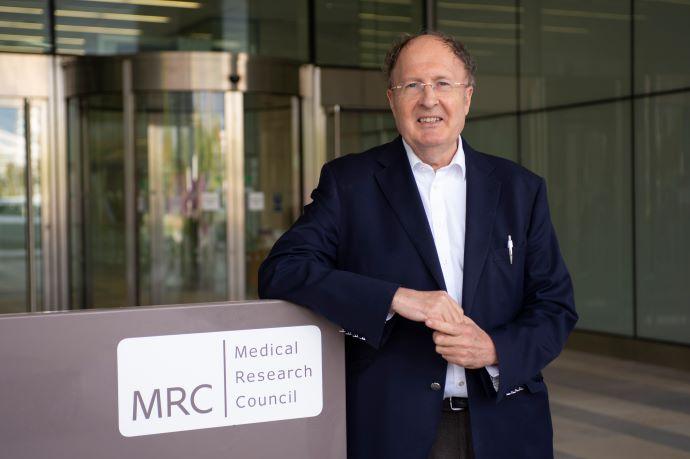The Royal Society’s Copley Medal is awarded annually for sustained, outstanding achievements in any field of science. Originally awarded in 1731, it is thought to be the world’s oldest scientific prize, predating the first Nobel Prize by 170 years.
Commenting in the award, Greg said: “I am very grateful to the Royal Society for this honour. It provides a great opportunity to thank my mentors, colleagues, post-docs and students for their myriad contributions in making therapeutic antibodies a scientific possibility, and the institutions, companies, clinicians, patients and investors that allowed our work to be applied. In particular I have to thank the Laboratory of Molecular Biology for sustaining the crucible in which scientific dreams can be made a reality.”
Greg’s research focus is genetic and protein engineering. In the 1980s he became interested in the idea that all antibodies have the same basic structure, with only a small change making them specific for one target. Building upon César Milstein and Georges Köhler’s monoclonal antibody technique – a method to isolate and produce many copies of the same individual antibody from the vast repertoire that the immune system makes – Greg pioneered techniques to make antibodies less likely to provoke an immune response in patients, and therefore better suited to human medical use. Therapeutic antibodies are now used to treat a wide variety of non-infectious diseases including cancer, rheumatoid arthritis and multiple sclerosis.
Using recombinant DNA technology, Greg showed how to “humanise” mouse monoclonal antibodies. He then demonstrated how to create fully human antibodies from libraries of human antibody genes – for this he was awarded the Nobel Prize in Chemistry in 2018. Most importantly this method allowed the generation of human antibodies to human self-antigens as required for treatment of non-infectious diseases.
To enable the transfer of these techniques to medicine, Greg established the spin-out company Cambridge Antibody Technology which made the antibody Humira (adalimumab). This antibody (marketed by Abbvie) proved invaluable for treatment of rheumatoid arthritis and Crohn’s Disease and for several years was the world’s top-selling pharmaceutical drug, with revenues peaking at over US $20 bn per year. It is still the world’s top selling drug ever based on life-time sales, which currently exceed $200 bn. Cambridge Antibody Technology floated in the London Stock Exchange in 1997, and was acquired by AstraZeneca in 2006. Greg later set up two other spin-outs based on his work at the LMB, Domantis (acquired by GlaxoSmithKline in 2007) and Bicycle Therapeutics (listed on NASDAQ in 2019).
Greg joined the LMB as a Ph.D. student and spent almost the entirety of his research career at the LMB and the MRC Centre for Protein Engineering (CPE). Greg has held numerous leadership positions, including Joint Head of the PNAC Division, Deputy Director of CPE, and Deputy Director and acting Director of the LMB. Greg is a Fellow of Trinity College, Cambridge and was the Master of Trinity from 2012 to 2019. He is currently a non-executive Director of Bicycle Therapeutics and two other Cambridge start-up companies, and a science partner of Ahren Innovation Capital.
Greg has received many accolades, including the Royal Society’s Royal Medal in 2011, the MRC’s 2013 Millenium Medal and the 2018 Nobel Prize for Chemistry. He is a Fellow of the Royal Society and of the Academy of Medical Sciences and he received a Knighthood for services to Molecular Biology in 2004.
Previous LMB winners of the Copley Medal include Alan Fersht (2020), Richard Henderson (2016), John Walker (2012), Hugh Huxley (1997), Sydney Brenner (1991), César Milstein (1989), Aaron Klug (1985), Max Perutz (1979). Fred Sanger (1977) and Francis Crick (1975).
Image credit: MRC Laboratory of Molecular Biology



